沪教牛津版中考英语必备基础单词短语句子+语法(1)
文档属性
| 名称 | 沪教牛津版中考英语必备基础单词短语句子+语法(1) | 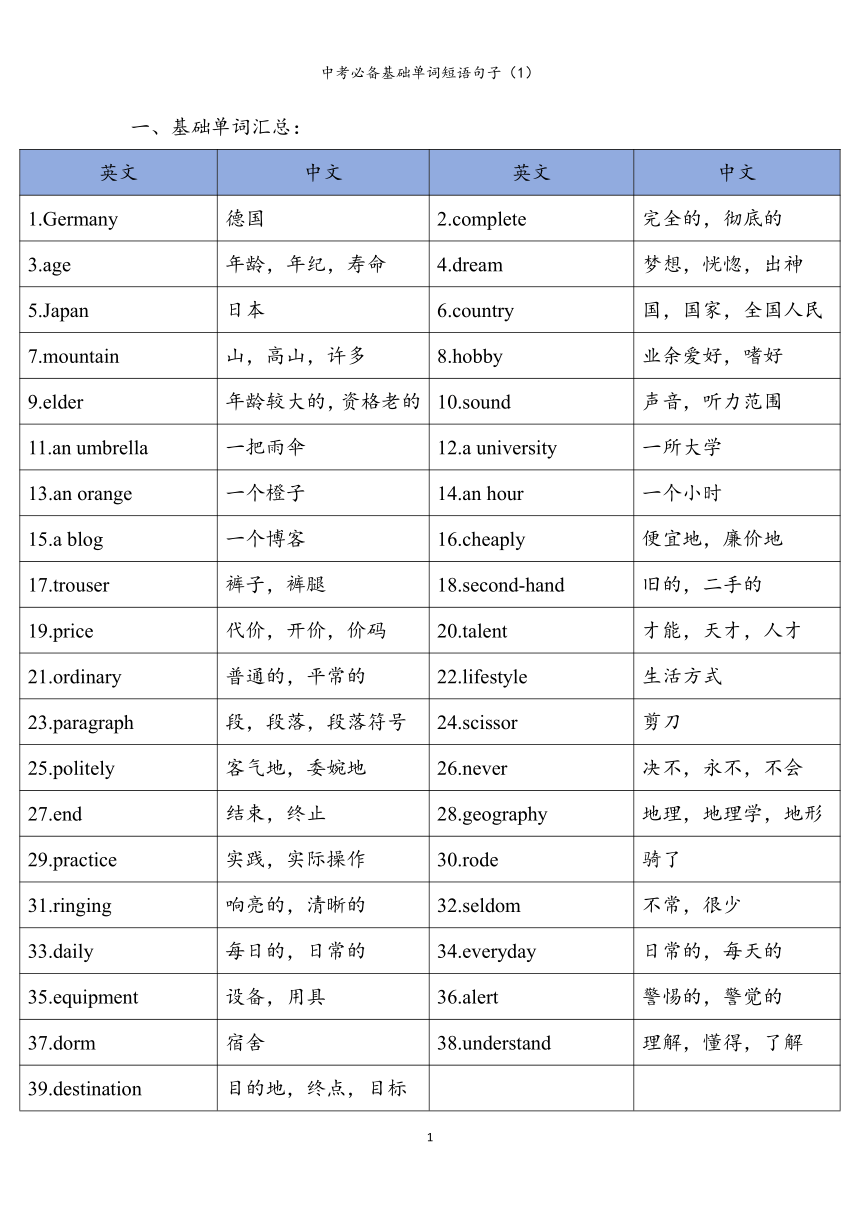 | |
| 格式 | docx | ||
| 文件大小 | 45.4KB | ||
| 资源类型 | 试卷 | ||
| 版本资源 | 沪教版 | ||
| 科目 | 英语 | ||
| 更新时间 | 2025-03-18 17:05:46 | ||
图片预览

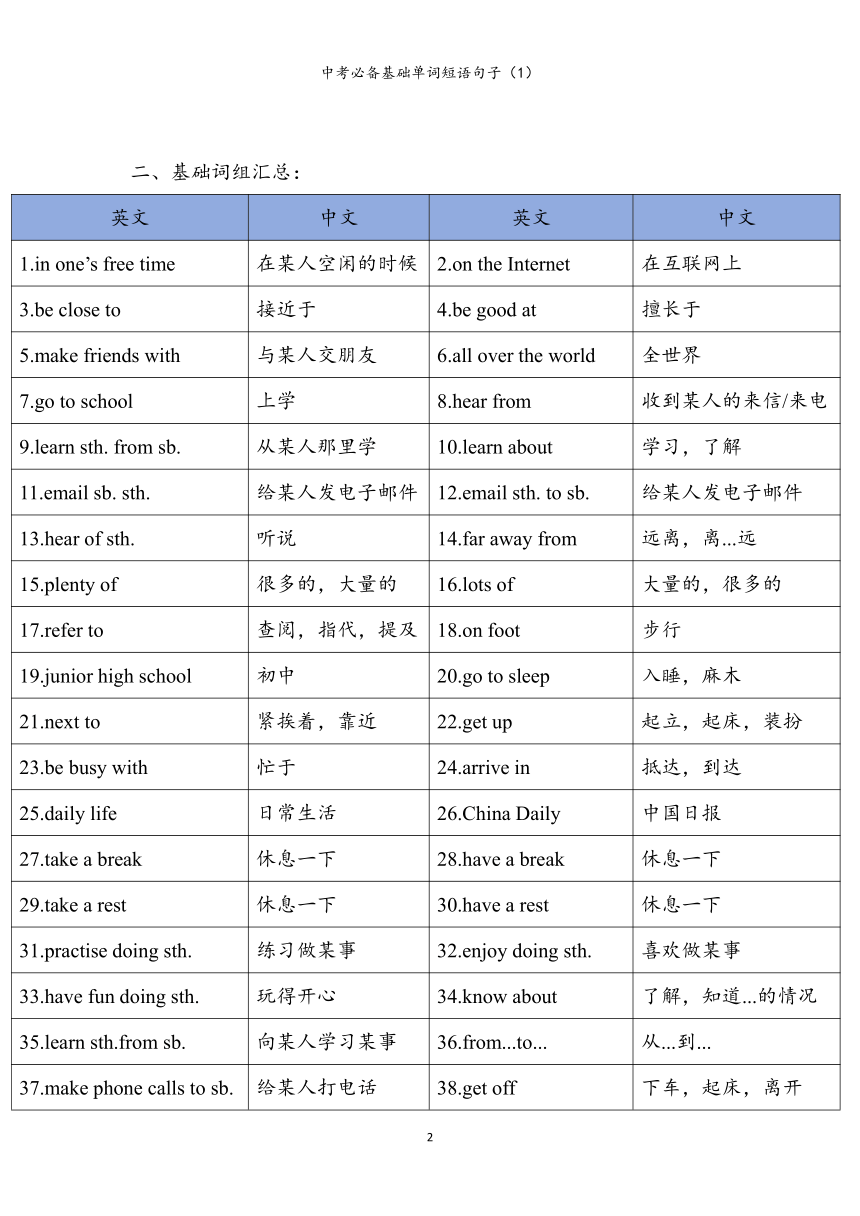
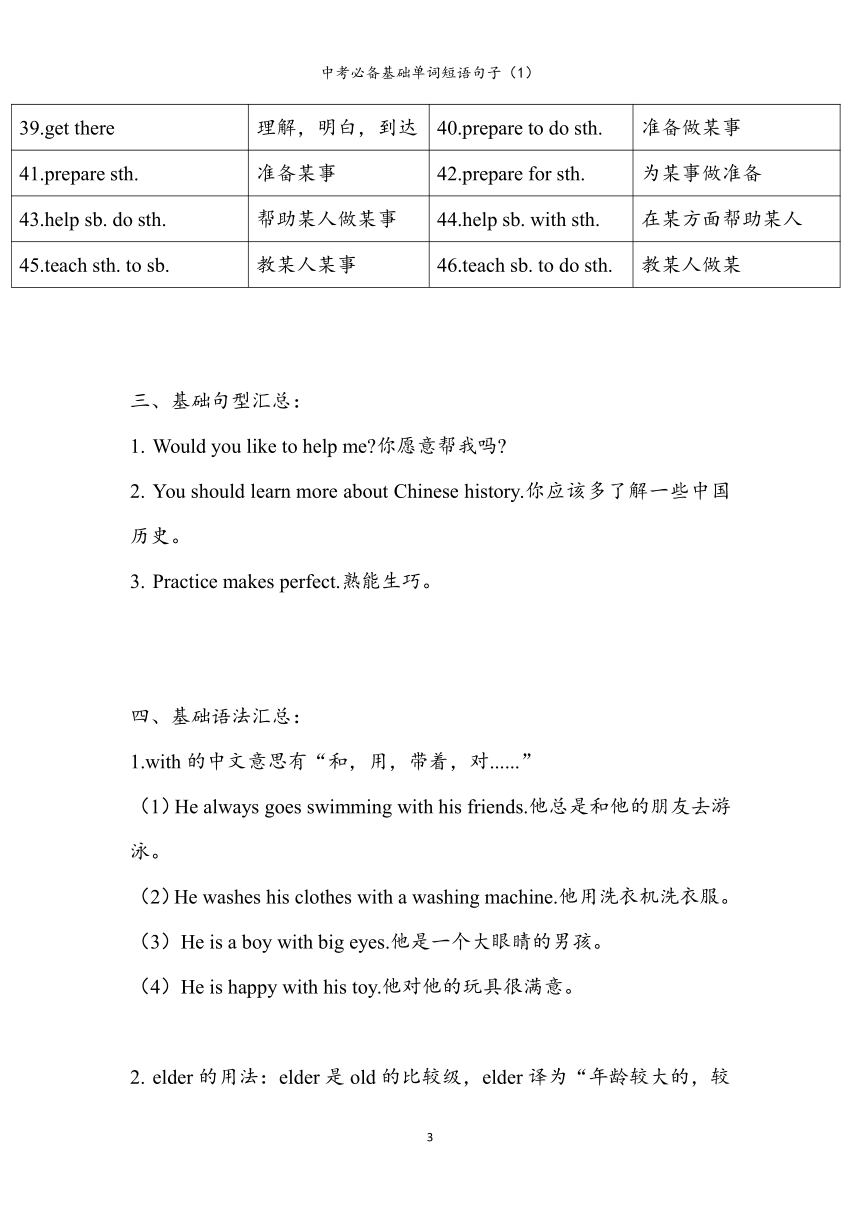
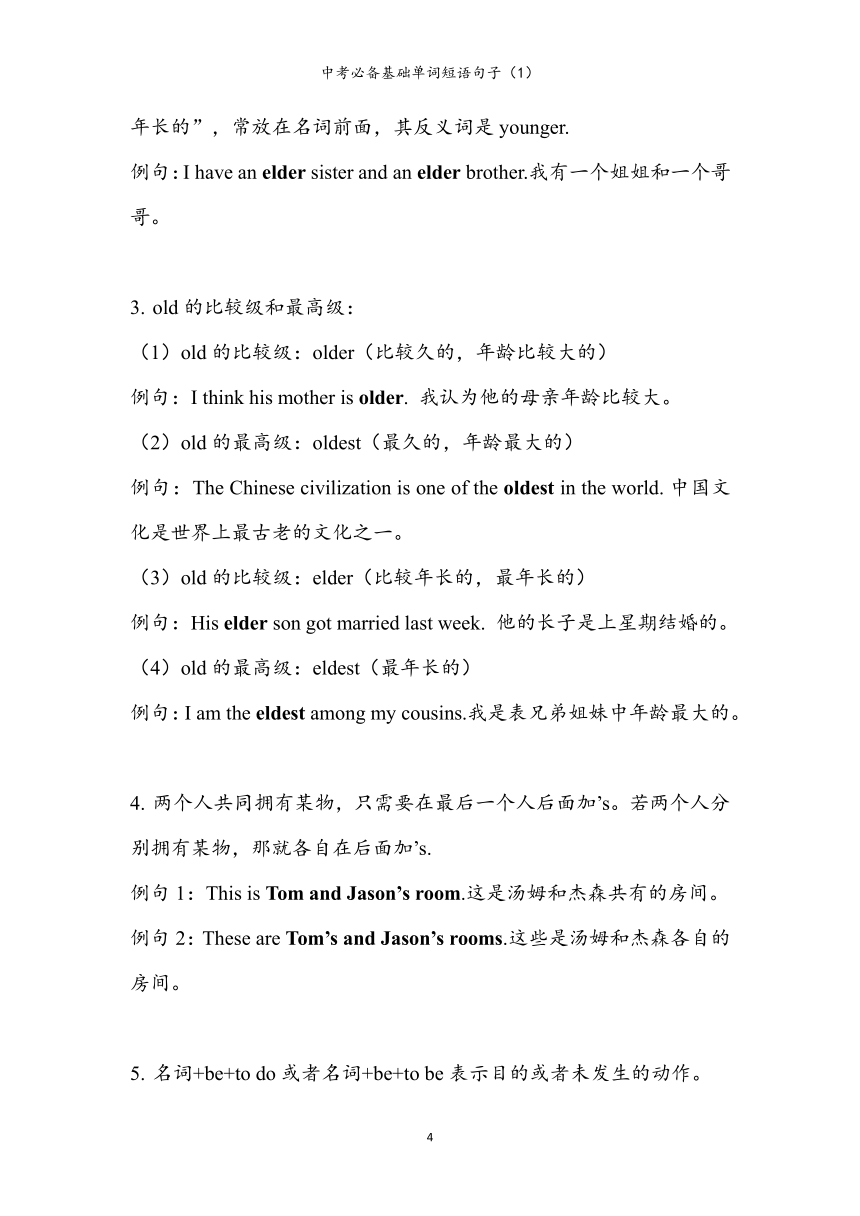
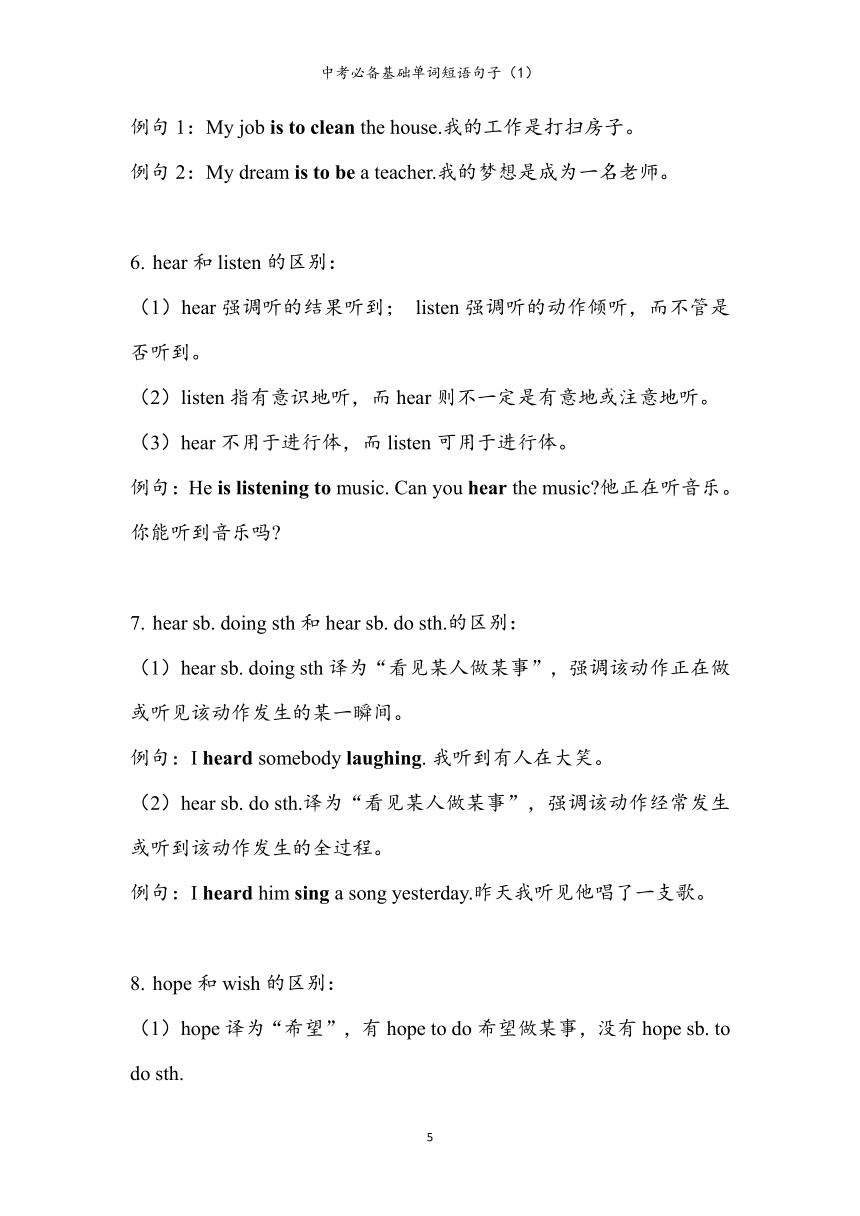
文档简介
中考必备基础单词短语句子(1)
基础单词汇总:
英文 中文 英文 中文
1.Germany 德国 2.complete 完全的,彻底的
3.age 年龄,年纪,寿命 4.dream 梦想,恍惚,出神
5.Japan 日本 6.country 国,国家,全国人民
7.mountain 山,高山,许多 8.hobby 业余爱好,嗜好
9.elder 年龄较大的,资格老的 10.sound 声音,听力范围
11.an umbrella 一把雨伞 12.a university 一所大学
13.an orange 一个橙子 14.an hour 一个小时
15.a blog 一个博客 16.cheaply 便宜地,廉价地
17.trouser 裤子,裤腿 18.second-hand 旧的,二手的
19.price 代价,开价,价码 20.talent 才能,天才,人才
21.ordinary 普通的,平常的 22.lifestyle 生活方式
23.paragraph 段,段落,段落符号 24.scissor 剪刀
25.politely 客气地,委婉地 26.never 决不,永不,不会
27.end 结束,终止 28.geography 地理,地理学,地形
29.practice 实践,实际操作 30.rode 骑了
31.ringing 响亮的,清晰的 32.seldom 不常,很少
33.daily 每日的,日常的 34.everyday 日常的,每天的
35.equipment 设备,用具 36.alert 警惕的,警觉的
37.dorm 宿舍 38.understand 理解,懂得,了解
39.destination 目的地,终点,目标
基础词组汇总:
英文 中文 英文 中文
1.in one’s free time 在某人空闲的时候 2.on the Internet 在互联网上
3.be close to 接近于 4.be good at 擅长于
5.make friends with 与某人交朋友 6.all over the world 全世界
7.go to school 上学 8.hear from 收到某人的来信/来电
9.learn sth. from sb. 从某人那里学 10.learn about 学习,了解
11.email sb. sth. 给某人发电子邮件 12.email sth. to sb. 给某人发电子邮件
13.hear of sth. 听说 14.far away from 远离,离...远
15.plenty of 很多的,大量的 16.lots of 大量的,很多的
17.refer to 查阅,指代,提及 18.on foot 步行
19.junior high school 初中 20.go to sleep 入睡,麻木
21.next to 紧挨着,靠近 22.get up 起立,起床,装扮
23.be busy with 忙于 24.arrive in 抵达,到达
25.daily life 日常生活 26.China Daily 中国日报
27.take a break 休息一下 28.have a break 休息一下
29.take a rest 休息一下 30.have a rest 休息一下
31.practise doing sth. 练习做某事 32.enjoy doing sth. 喜欢做某事
33.have fun doing sth. 玩得开心 34.know about 了解,知道...的情况
35.learn sth.from sb. 向某人学习某事 36.from...to... 从...到...
37.make phone calls to sb. 给某人打电话 38.get off 下车,起床,离开
39.get there 理解,明白,到达 40.prepare to do sth. 准备做某事
41.prepare sth. 准备某事 42.prepare for sth. 为某事做准备
43.help sb. do sth. 帮助某人做某事 44.help sb. with sth. 在某方面帮助某人
45.teach sth. to sb. 教某人某事 46.teach sb. to do sth. 教某人做某
基础句型汇总:
Would you like to help me 你愿意帮我吗
You should learn more about Chinese history.你应该多了解一些中国历史。
Practice makes perfect.熟能生巧。
四、基础语法汇总:
1.with的中文意思有“和,用,带着,对......”
(1)He always goes swimming with his friends.他总是和他的朋友去游泳。
(2)He washes his clothes with a washing machine.他用洗衣机洗衣服。
(3)He is a boy with big eyes.他是一个大眼睛的男孩。
(4)He is happy with his toy.他对他的玩具很满意。
elder的用法:elder是old的比较级,elder译为“年龄较大的,较年长的”,常放在名词前面,其反义词是younger.
例句:I have an elder sister and an elder brother.我有一个姐姐和一个哥哥。
old的比较级和最高级:
old的比较级:older(比较久的,年龄比较大的)
例句:I think his mother is older. 我认为他的母亲年龄比较大。
old的最高级:oldest(最久的,年龄最大的)
例句:The Chinese civilization is one of the oldest in the world. 中国文化是世界上最古老的文化之一。
old的比较级:elder(比较年长的,最年长的)
例句:His elder son got married last week. 他的长子是上星期结婚的。
old的最高级:eldest(最年长的)
例句:I am the eldest among my cousins.我是表兄弟姐妹中年龄最大的。
两个人共同拥有某物,只需要在最后一个人后面加’s。若两个人分别拥有某物,那就各自在后面加’s.
例句1:This is Tom and Jason’s room.这是汤姆和杰森共有的房间。
例句2:These are Tom’s and Jason’s rooms.这些是汤姆和杰森各自的房间。
名词+be+to do或者名词+be+to be表示目的或者未发生的动作。
例句1:My job is to clean the house.我的工作是打扫房子。
例句2:My dream is to be a teacher.我的梦想是成为一名老师。
hear和listen的区别:
(1)hear强调听的结果听到; listen强调听的动作倾听,而不管是否听到。
(2)listen指有意识地听,而hear则不一定是有意地或注意地听。
(3)hear不用于进行体,而listen可用于进行体。
例句:He is listening to music. Can you hear the music 他正在听音乐。你能听到音乐吗
hear sb. doing sth和hear sb. do sth.的区别:
hear sb. doing sth译为“看见某人做某事”,强调该动作正在做或听见该动作发生的某一瞬间。
例句:I heard somebody laughing. 我听到有人在大笑。
hear sb. do sth.译为“看见某人做某事”,强调该动作经常发生或听到该动作发生的全过程。
例句:I heard him sing a song yesterday.昨天我听见他唱了一支歌。
hope和wish的区别:
hope译为“希望”,有hope to do希望做某事,没有hope sb. to do sth.
例句:We all hope to be successful in our life.我们都希望在生活中取得成功。
wish译为“愿望,希望,祝愿”,做动词是指难以实现的愿望或美好的愿望,有wish to do, wish sb. sth.和wish sb. to do的搭配。
例句:I wished to have wings when I was a child.小时候我希望有对翅膀。
in, on,和at的时间用法:
(1)in加较长的时间段,月份,年份,世纪和季节等。如in the morning.
(2)on加具体的日期,星期,上午/下午/晚上前加修饰词时(如:某天的下午),也需要用on. 如on a warm morning. 特殊用法:on weekdays
(3)at加具体时刻,日出和日落等。如at five o’clock. 特殊用法:at the weekend
10.零冠词的用法:
在三餐、球类运动和棋类前,用零冠词。
例句:I often play basketball after school.放学后我经常打篮球。
在与by连用的交通工具名称前,用零冠词。
例句:I often go to school by bus.我乘公共汽车去上学。
名词前有this, that, my, some, whose, any, no, each等前,用零冠词。
例句:Each student in the class studies hard.班上每个学生都努力学习。
在一些习惯用于前用零冠词。如:at night.在晚上。
11.定冠词the的用法:
表示特指或者是上文已经提到过的人或者物。
例句:I have a book. The book is very interesting.我有一本书。我有一本书。
用于序数词或者最高级前面。
例句1:The first lesson is very easy.第一课很简单。
例句2:She is the most careful student in our class.她是我们班最细心的学生。
用于姓氏复数前表示一家人或者夫妻俩。
例句:The Greens are watching TV now.格林一家正在看电视。
用于普通名词构成的专有名词前,表示国家、党派、组织机构、报刊、条约、朝代、江、河、湖、海、山、川、群岛等
例子:The Great Wall长城
与形容词连用表示一类人。
例句:The rich should help the poor.富人应该帮助穷人
用于方位名词或西洋乐器名词前。
例句1:Jilin is the north of China.吉林在中国的北部。
例句2:I like playing the piano.我喜欢弹钢琴。
用于世界上独一无二的事物的名词之前。如:the sun, the moon, the sky等
用于单数可数名词前,表示某一类人或者物。
例句:The horse is a useful animal.马是有用的动物。
用于世纪的某一个年代前。如in the 1990s.等
用于某些表示民族或者国家的形容词前,泛指全体,这些词常与-sh, -ch, -ese结尾。如the English, the Chinese.
习惯用语。如:in the end, on the other hand等
12.不定冠词a/ an的用法:
a/ an常用于可数名词单数前, 其中a用于辅音音素前,an用于元音音素前。如:a uniform, an hour等。
表示某一类人或事物中的任何一个,经常是第一次提到某人或者某物。
例句:There is a “L” in the word “travel”.“旅行”这个词里有一个“L”。
表示人或者事物的某一类,强调整体,以一个表示整体。
例句:A teacher is a person who teaches. 教师就是教书的人。
放在时间、速度、价格等前,译为“每一”,相当于every.
例句:There are 60 seconds in a minute.一分钟有60秒。
用于说明某人的身份。
例句:Mike is a teacher.迈克是一名教师。
在感叹句中用于单数可数名词前。
例句:What a beautiful rose it is!多漂亮的玫瑰啊!
用于固定搭配。如:in a minute一会儿,立刻。
13.常考的疑问代词:
(1)How soon译为“过多久”,一般用在将来时中,通常用“in+一段时间”回答。
例句:——How soon will the invitation be sent to our guests 邀请函什么时候能寄给我们的客人
——In two days.两天后。
(2)How long译为“多长时间”,提问时间段,通常用“for+一段时间”回答。
例句:——How long have they studied English 他们学英语多久了
——They have studied English for two years.他们已经学了两年英语了。
How much+不可数名词,译为“多少”,用于询问数量或程度。
例句:How much milk is there in the glass.玻璃杯里有多少牛奶?
How many+可数名词的复数,译为“多少”。
例句:How many apples do you have 你有多少苹果?
How often译为“多久一次”,对动作在时间上所发生的频率提问。
例句:How often do you brush your teeth 你多久刷一次牙?
14.一般疑问句:
(1)助动词/情态动词 + 主语 + 动词原形 + 其它?
例句:Does she often have colds 她常常感冒吗
(2)be动词 + 主语 + 其它/动词ing形式?
例句:Is he interested in going 他有兴趣去吗
15.特殊疑问句:
特殊疑问词 + 助动词/情态动词 + 主语 + 动词原形+其它?
例句:When shall we meet 我们什么时候见面?
特殊疑问词 + be动词 + 主语 + 其它/动词ing形式?
例句:What are you doing 你在干什么
规律:一般疑问句和特殊疑问句中,若谓语中有be动词或者情态动词,就把它们提到主语前面,后面照抄即可。如没有be动词或者情态动词,就借助助动词(do,does,did),把助动词放到主语前即可。
like to do和like doing的区别:
like to do译为“想要做某事”,指某个具体的动作,表示偶尔一次喜欢做某事、或者突然喜欢干某事,即强调某一次的喜欢。
例句:She likes to swim this afternoon.她今天下午想游泳。(某一次的爱好)
like doing译为“喜爱做某事”,长时间的喜欢做某事,即强调反复,多次的喜欢。
例句:I like swimming.她喜欢游泳。(经常性的爱好)
everyday和every day的区别:
everyday=daily译为“每天的,日常的”,是形容词。
例句:In the course of my everyday life, I had very little contact with teenagers.在我的日常生活中,我与青少年少有接触。
every day译为“每日地,日复一日地”,是副词。
例句:I exercise every day.我每天都锻炼。
频率副词:
always(总是,每次都是), usually(通常地,经常地), often(常常,时常), sometimes(有时,间或), seldom(不常,很少), hardly(几乎不,几乎没有), never(决不,永不)
频率副词放在实义动词前,be动词或情态动词或者助动词之后。提问频率时用How often
例句1:He is never late for school.他上学从不迟到。
例句2:We often go there. 我们常去那儿。
后跟动词ing形式的动词常有:like, love, enjoy, keep, finish, go, spend, start, begin等。
例句:You should keep studying hard, then you can make progress.你应该继续努力学习,这样你才能取得进步。
20.take part in, join in, join 和attend的区别:
(1)take part in指参加群众性活动、会议、劳动等,往往指参加者持有积极的态度,起一份作用,有时与join in可互换。
例句:All the students should take an active part in the thorough cleaning.所有的学生都应该积极参加大扫除。
(2)join in通常指参加某种活动,尤其指和其他人一起参加某项活动。常用于口语。
例句:May I join in the game 我可以参加这个游戏吗
(3)join指加入某党派、某组织或某社会团体,以及参军等,还可表示参与某种活动。
例句:I will never forget the day when I joined the army.我永远不会忘记我参军的那一天。
(4)attend常指参加或出席正式的活动或场合,如婚礼,会议等。
例句:He did not attend the important meeting yesterday.他没有参加昨天的重要会议。
21.感叹句(口诀:what名how形副):(由What或者How引导)
(1)What + a/an +adj.+可数名词单数+主语+谓语!
例句:What a clever girl she is!多么聪明的姑娘呀!
(2)What + adj. + 可数名词复数 + 主语+谓语!
例句:What beautiful flowers they are!多么漂亮的花呀!
(3)What + adj. + 不可数名词 + 主语+谓语!
例句:What heavy snow it is!多么大的雪呀!
(4)How + adj./adv. + 主语+谓语!
例句:How cold it is today!今天多么冷呀!
(5)How + adj. + a/an +可数名词单数+主语+谓语!
例句:How kind a boy he is!他真是一个善良的小男孩儿呀!
(6)How +主语+谓语!
例句:How time flies!时光飞逝!
一般现在时的用法:
(1)表示客观事实和普遍真理,以及谚语和格言等用一般现在时,即使主句的谓语动词是其它时态。
例句1:Did the teacher tell you why the earth goes around the sun 老师告诉你为什么地球绕着太阳转了吗
例句2:Pride goes before a fall.骄者必败。
(2)表示现在的状态和主语的特征。常见的表示状态的动词有:be, have, love, like, know, see, hear等
例句:I am not at college.我不在上大学。
(3)表示经常发生或者习惯性动作,常与频率副词连用。
例句:We usually go to school at 7:30. 我们通常7点30上学去。
(4)在时间状语从句和条件状语从句中,用一般现在时表示将来时的动作。
例句:I’ll write to you as soon as I arrive there.我一到那里就给你写信。
together with和with都表示伴随作用,谓语遵循“就远原则”。
例句:She, together with her sisters, is planning a trip to Europe.她和她的姐妹们正在计划一次欧洲之旅。
三种“到达”表示:
arrive in + 大地点 或者 arrive at + 小地点
例句1:We arrived at the airport at 8 o'clock.我们八点钟到达机场。
例句2:They arrived in New York last night.他们昨晚到达纽约。
get to + 地点
例句:I need to get to the airport before my flight.我需要在飞机起飞前到达机场。
reach + 地点
例句:I will reach the airport by 9 pm.我将在晚上9点到达机场。
注意:当地点为there, here, home时,“到达”短语前不需要加介词。如get there
五、重点语法汇总:
1.another, other, the others, others, 和 the other的区别:
(1)another 可以是形容词也可以是代词,指的是三个以上的“另一个”,与单数名词连用。
例句:My brother is also in another picture.我哥哥也在另一张照片里。
(2)Other 译为“另外的”,可以用在名词前做定语,其后可以跟复数名词或不可数名词。
例句:Other information can be obtained by calling the number.其他信息可通过拨打该号码获取。
(3)the other 两者中的“另外个”(范围就两个),经常与one 连用,句型 “one...the other... ”。
例句:The man has two bags. One is yellow, the other is black.这个人有两个包。一个是黄色的,另一个是黑色的。
(4)others 译为“其他的人或事物”,等于“other+名词复数”,指另一些,并不是指全部。通常用在句型“some... others”中,表示“一些......另一些......”。
例句:There are 40 students in the park. Some are playing football, others are playing badminton.公园里有40名学生。一些人在踢足球,另一些人在打羽毛球。
(5)the others 表示某一范围内的“其他人或物”,等于“the other+名词复数”,指的是一定范围内剩余的全部。在句型“some... the others”中,表示“一些......剩下的那些.....”。
例句:There are 40 students in the park. Some are playing football, the others are playing badminton.公园里有40名学生。一些人在踢足球,剩下的那些人在打羽毛球。
many other +可数名词复数,译为“许多其他的......”
例句:Many other people don’t agree about this opinion because they have different life experiences.许多其他人不同意这个观点,因为他们有不同的生活经历。
规则:有名无s, 有the有范围。
名词所有格:
被修饰词有生命:名词’s +名词。如Mike’s bag迈克的书包
被修饰词以s结尾:名词’+名词。如teachers’ office教师的办公室
被修饰词没有生命:名词+ of +名词。如the cover of the book书的封面
被修饰词是answer, way, key等:名词+to+名词。如the answer to this question这个问题的答案
双重所有格的使用:限定词+名词+of+名词所有格(或名词性物主代词)
(1)受双重所有格修饰的名词不能是专有名词或具有独一无二性质的名词,如不说a father of Mike’s,可改说Mike’s father。
(2)受双重所有格修饰的名词不能带定冠词,但可带指示代词this, that, these或those,表示某种感彩(如赞赏、厌恶等),如不说 the masterpiece of Tom’s,但可说 this / that masterpiece of Tom’s。
(3)双重所有格中带-’s所有格的名词应是确指的,如不说 a brother of a friend’s,但可说 a friend of my friend’s。
(4)双重所有格中带-’s所有格的名词应是有生命的,如不说a door of the room’s,应改为a door of the room.
句型变化:有be用be, 有情(情态动词)有情,没情没be用助动词。
肯定句变为否定句:be + not或者助动词+ not. 注意:有some要改为any,有and要改为or.
陈述句:He enjoys playing basketball and football.他喜欢打篮球和踢足球。
否定句:He doesn’t enjoy playing basketball or football.他不喜欢打篮球或踢足球。
肯定句变为一般疑问句:be动词或者情态动词或者助动词提到主语前面。注意:有some要改为any,有and要改为or,第一人称要改为第二人称。
陈述句:I have some books.我有一些书。
一般疑问句:Do you have any books 你有书吗
基础单词汇总:
英文 中文 英文 中文
1.Germany 德国 2.complete 完全的,彻底的
3.age 年龄,年纪,寿命 4.dream 梦想,恍惚,出神
5.Japan 日本 6.country 国,国家,全国人民
7.mountain 山,高山,许多 8.hobby 业余爱好,嗜好
9.elder 年龄较大的,资格老的 10.sound 声音,听力范围
11.an umbrella 一把雨伞 12.a university 一所大学
13.an orange 一个橙子 14.an hour 一个小时
15.a blog 一个博客 16.cheaply 便宜地,廉价地
17.trouser 裤子,裤腿 18.second-hand 旧的,二手的
19.price 代价,开价,价码 20.talent 才能,天才,人才
21.ordinary 普通的,平常的 22.lifestyle 生活方式
23.paragraph 段,段落,段落符号 24.scissor 剪刀
25.politely 客气地,委婉地 26.never 决不,永不,不会
27.end 结束,终止 28.geography 地理,地理学,地形
29.practice 实践,实际操作 30.rode 骑了
31.ringing 响亮的,清晰的 32.seldom 不常,很少
33.daily 每日的,日常的 34.everyday 日常的,每天的
35.equipment 设备,用具 36.alert 警惕的,警觉的
37.dorm 宿舍 38.understand 理解,懂得,了解
39.destination 目的地,终点,目标
基础词组汇总:
英文 中文 英文 中文
1.in one’s free time 在某人空闲的时候 2.on the Internet 在互联网上
3.be close to 接近于 4.be good at 擅长于
5.make friends with 与某人交朋友 6.all over the world 全世界
7.go to school 上学 8.hear from 收到某人的来信/来电
9.learn sth. from sb. 从某人那里学 10.learn about 学习,了解
11.email sb. sth. 给某人发电子邮件 12.email sth. to sb. 给某人发电子邮件
13.hear of sth. 听说 14.far away from 远离,离...远
15.plenty of 很多的,大量的 16.lots of 大量的,很多的
17.refer to 查阅,指代,提及 18.on foot 步行
19.junior high school 初中 20.go to sleep 入睡,麻木
21.next to 紧挨着,靠近 22.get up 起立,起床,装扮
23.be busy with 忙于 24.arrive in 抵达,到达
25.daily life 日常生活 26.China Daily 中国日报
27.take a break 休息一下 28.have a break 休息一下
29.take a rest 休息一下 30.have a rest 休息一下
31.practise doing sth. 练习做某事 32.enjoy doing sth. 喜欢做某事
33.have fun doing sth. 玩得开心 34.know about 了解,知道...的情况
35.learn sth.from sb. 向某人学习某事 36.from...to... 从...到...
37.make phone calls to sb. 给某人打电话 38.get off 下车,起床,离开
39.get there 理解,明白,到达 40.prepare to do sth. 准备做某事
41.prepare sth. 准备某事 42.prepare for sth. 为某事做准备
43.help sb. do sth. 帮助某人做某事 44.help sb. with sth. 在某方面帮助某人
45.teach sth. to sb. 教某人某事 46.teach sb. to do sth. 教某人做某
基础句型汇总:
Would you like to help me 你愿意帮我吗
You should learn more about Chinese history.你应该多了解一些中国历史。
Practice makes perfect.熟能生巧。
四、基础语法汇总:
1.with的中文意思有“和,用,带着,对......”
(1)He always goes swimming with his friends.他总是和他的朋友去游泳。
(2)He washes his clothes with a washing machine.他用洗衣机洗衣服。
(3)He is a boy with big eyes.他是一个大眼睛的男孩。
(4)He is happy with his toy.他对他的玩具很满意。
elder的用法:elder是old的比较级,elder译为“年龄较大的,较年长的”,常放在名词前面,其反义词是younger.
例句:I have an elder sister and an elder brother.我有一个姐姐和一个哥哥。
old的比较级和最高级:
old的比较级:older(比较久的,年龄比较大的)
例句:I think his mother is older. 我认为他的母亲年龄比较大。
old的最高级:oldest(最久的,年龄最大的)
例句:The Chinese civilization is one of the oldest in the world. 中国文化是世界上最古老的文化之一。
old的比较级:elder(比较年长的,最年长的)
例句:His elder son got married last week. 他的长子是上星期结婚的。
old的最高级:eldest(最年长的)
例句:I am the eldest among my cousins.我是表兄弟姐妹中年龄最大的。
两个人共同拥有某物,只需要在最后一个人后面加’s。若两个人分别拥有某物,那就各自在后面加’s.
例句1:This is Tom and Jason’s room.这是汤姆和杰森共有的房间。
例句2:These are Tom’s and Jason’s rooms.这些是汤姆和杰森各自的房间。
名词+be+to do或者名词+be+to be表示目的或者未发生的动作。
例句1:My job is to clean the house.我的工作是打扫房子。
例句2:My dream is to be a teacher.我的梦想是成为一名老师。
hear和listen的区别:
(1)hear强调听的结果听到; listen强调听的动作倾听,而不管是否听到。
(2)listen指有意识地听,而hear则不一定是有意地或注意地听。
(3)hear不用于进行体,而listen可用于进行体。
例句:He is listening to music. Can you hear the music 他正在听音乐。你能听到音乐吗
hear sb. doing sth和hear sb. do sth.的区别:
hear sb. doing sth译为“看见某人做某事”,强调该动作正在做或听见该动作发生的某一瞬间。
例句:I heard somebody laughing. 我听到有人在大笑。
hear sb. do sth.译为“看见某人做某事”,强调该动作经常发生或听到该动作发生的全过程。
例句:I heard him sing a song yesterday.昨天我听见他唱了一支歌。
hope和wish的区别:
hope译为“希望”,有hope to do希望做某事,没有hope sb. to do sth.
例句:We all hope to be successful in our life.我们都希望在生活中取得成功。
wish译为“愿望,希望,祝愿”,做动词是指难以实现的愿望或美好的愿望,有wish to do, wish sb. sth.和wish sb. to do的搭配。
例句:I wished to have wings when I was a child.小时候我希望有对翅膀。
in, on,和at的时间用法:
(1)in加较长的时间段,月份,年份,世纪和季节等。如in the morning.
(2)on加具体的日期,星期,上午/下午/晚上前加修饰词时(如:某天的下午),也需要用on. 如on a warm morning. 特殊用法:on weekdays
(3)at加具体时刻,日出和日落等。如at five o’clock. 特殊用法:at the weekend
10.零冠词的用法:
在三餐、球类运动和棋类前,用零冠词。
例句:I often play basketball after school.放学后我经常打篮球。
在与by连用的交通工具名称前,用零冠词。
例句:I often go to school by bus.我乘公共汽车去上学。
名词前有this, that, my, some, whose, any, no, each等前,用零冠词。
例句:Each student in the class studies hard.班上每个学生都努力学习。
在一些习惯用于前用零冠词。如:at night.在晚上。
11.定冠词the的用法:
表示特指或者是上文已经提到过的人或者物。
例句:I have a book. The book is very interesting.我有一本书。我有一本书。
用于序数词或者最高级前面。
例句1:The first lesson is very easy.第一课很简单。
例句2:She is the most careful student in our class.她是我们班最细心的学生。
用于姓氏复数前表示一家人或者夫妻俩。
例句:The Greens are watching TV now.格林一家正在看电视。
用于普通名词构成的专有名词前,表示国家、党派、组织机构、报刊、条约、朝代、江、河、湖、海、山、川、群岛等
例子:The Great Wall长城
与形容词连用表示一类人。
例句:The rich should help the poor.富人应该帮助穷人
用于方位名词或西洋乐器名词前。
例句1:Jilin is the north of China.吉林在中国的北部。
例句2:I like playing the piano.我喜欢弹钢琴。
用于世界上独一无二的事物的名词之前。如:the sun, the moon, the sky等
用于单数可数名词前,表示某一类人或者物。
例句:The horse is a useful animal.马是有用的动物。
用于世纪的某一个年代前。如in the 1990s.等
用于某些表示民族或者国家的形容词前,泛指全体,这些词常与-sh, -ch, -ese结尾。如the English, the Chinese.
习惯用语。如:in the end, on the other hand等
12.不定冠词a/ an的用法:
a/ an常用于可数名词单数前, 其中a用于辅音音素前,an用于元音音素前。如:a uniform, an hour等。
表示某一类人或事物中的任何一个,经常是第一次提到某人或者某物。
例句:There is a “L” in the word “travel”.“旅行”这个词里有一个“L”。
表示人或者事物的某一类,强调整体,以一个表示整体。
例句:A teacher is a person who teaches. 教师就是教书的人。
放在时间、速度、价格等前,译为“每一”,相当于every.
例句:There are 60 seconds in a minute.一分钟有60秒。
用于说明某人的身份。
例句:Mike is a teacher.迈克是一名教师。
在感叹句中用于单数可数名词前。
例句:What a beautiful rose it is!多漂亮的玫瑰啊!
用于固定搭配。如:in a minute一会儿,立刻。
13.常考的疑问代词:
(1)How soon译为“过多久”,一般用在将来时中,通常用“in+一段时间”回答。
例句:——How soon will the invitation be sent to our guests 邀请函什么时候能寄给我们的客人
——In two days.两天后。
(2)How long译为“多长时间”,提问时间段,通常用“for+一段时间”回答。
例句:——How long have they studied English 他们学英语多久了
——They have studied English for two years.他们已经学了两年英语了。
How much+不可数名词,译为“多少”,用于询问数量或程度。
例句:How much milk is there in the glass.玻璃杯里有多少牛奶?
How many+可数名词的复数,译为“多少”。
例句:How many apples do you have 你有多少苹果?
How often译为“多久一次”,对动作在时间上所发生的频率提问。
例句:How often do you brush your teeth 你多久刷一次牙?
14.一般疑问句:
(1)助动词/情态动词 + 主语 + 动词原形 + 其它?
例句:Does she often have colds 她常常感冒吗
(2)be动词 + 主语 + 其它/动词ing形式?
例句:Is he interested in going 他有兴趣去吗
15.特殊疑问句:
特殊疑问词 + 助动词/情态动词 + 主语 + 动词原形+其它?
例句:When shall we meet 我们什么时候见面?
特殊疑问词 + be动词 + 主语 + 其它/动词ing形式?
例句:What are you doing 你在干什么
规律:一般疑问句和特殊疑问句中,若谓语中有be动词或者情态动词,就把它们提到主语前面,后面照抄即可。如没有be动词或者情态动词,就借助助动词(do,does,did),把助动词放到主语前即可。
like to do和like doing的区别:
like to do译为“想要做某事”,指某个具体的动作,表示偶尔一次喜欢做某事、或者突然喜欢干某事,即强调某一次的喜欢。
例句:She likes to swim this afternoon.她今天下午想游泳。(某一次的爱好)
like doing译为“喜爱做某事”,长时间的喜欢做某事,即强调反复,多次的喜欢。
例句:I like swimming.她喜欢游泳。(经常性的爱好)
everyday和every day的区别:
everyday=daily译为“每天的,日常的”,是形容词。
例句:In the course of my everyday life, I had very little contact with teenagers.在我的日常生活中,我与青少年少有接触。
every day译为“每日地,日复一日地”,是副词。
例句:I exercise every day.我每天都锻炼。
频率副词:
always(总是,每次都是), usually(通常地,经常地), often(常常,时常), sometimes(有时,间或), seldom(不常,很少), hardly(几乎不,几乎没有), never(决不,永不)
频率副词放在实义动词前,be动词或情态动词或者助动词之后。提问频率时用How often
例句1:He is never late for school.他上学从不迟到。
例句2:We often go there. 我们常去那儿。
后跟动词ing形式的动词常有:like, love, enjoy, keep, finish, go, spend, start, begin等。
例句:You should keep studying hard, then you can make progress.你应该继续努力学习,这样你才能取得进步。
20.take part in, join in, join 和attend的区别:
(1)take part in指参加群众性活动、会议、劳动等,往往指参加者持有积极的态度,起一份作用,有时与join in可互换。
例句:All the students should take an active part in the thorough cleaning.所有的学生都应该积极参加大扫除。
(2)join in通常指参加某种活动,尤其指和其他人一起参加某项活动。常用于口语。
例句:May I join in the game 我可以参加这个游戏吗
(3)join指加入某党派、某组织或某社会团体,以及参军等,还可表示参与某种活动。
例句:I will never forget the day when I joined the army.我永远不会忘记我参军的那一天。
(4)attend常指参加或出席正式的活动或场合,如婚礼,会议等。
例句:He did not attend the important meeting yesterday.他没有参加昨天的重要会议。
21.感叹句(口诀:what名how形副):(由What或者How引导)
(1)What + a/an +adj.+可数名词单数+主语+谓语!
例句:What a clever girl she is!多么聪明的姑娘呀!
(2)What + adj. + 可数名词复数 + 主语+谓语!
例句:What beautiful flowers they are!多么漂亮的花呀!
(3)What + adj. + 不可数名词 + 主语+谓语!
例句:What heavy snow it is!多么大的雪呀!
(4)How + adj./adv. + 主语+谓语!
例句:How cold it is today!今天多么冷呀!
(5)How + adj. + a/an +可数名词单数+主语+谓语!
例句:How kind a boy he is!他真是一个善良的小男孩儿呀!
(6)How +主语+谓语!
例句:How time flies!时光飞逝!
一般现在时的用法:
(1)表示客观事实和普遍真理,以及谚语和格言等用一般现在时,即使主句的谓语动词是其它时态。
例句1:Did the teacher tell you why the earth goes around the sun 老师告诉你为什么地球绕着太阳转了吗
例句2:Pride goes before a fall.骄者必败。
(2)表示现在的状态和主语的特征。常见的表示状态的动词有:be, have, love, like, know, see, hear等
例句:I am not at college.我不在上大学。
(3)表示经常发生或者习惯性动作,常与频率副词连用。
例句:We usually go to school at 7:30. 我们通常7点30上学去。
(4)在时间状语从句和条件状语从句中,用一般现在时表示将来时的动作。
例句:I’ll write to you as soon as I arrive there.我一到那里就给你写信。
together with和with都表示伴随作用,谓语遵循“就远原则”。
例句:She, together with her sisters, is planning a trip to Europe.她和她的姐妹们正在计划一次欧洲之旅。
三种“到达”表示:
arrive in + 大地点 或者 arrive at + 小地点
例句1:We arrived at the airport at 8 o'clock.我们八点钟到达机场。
例句2:They arrived in New York last night.他们昨晚到达纽约。
get to + 地点
例句:I need to get to the airport before my flight.我需要在飞机起飞前到达机场。
reach + 地点
例句:I will reach the airport by 9 pm.我将在晚上9点到达机场。
注意:当地点为there, here, home时,“到达”短语前不需要加介词。如get there
五、重点语法汇总:
1.another, other, the others, others, 和 the other的区别:
(1)another 可以是形容词也可以是代词,指的是三个以上的“另一个”,与单数名词连用。
例句:My brother is also in another picture.我哥哥也在另一张照片里。
(2)Other 译为“另外的”,可以用在名词前做定语,其后可以跟复数名词或不可数名词。
例句:Other information can be obtained by calling the number.其他信息可通过拨打该号码获取。
(3)the other 两者中的“另外个”(范围就两个),经常与one 连用,句型 “one...the other... ”。
例句:The man has two bags. One is yellow, the other is black.这个人有两个包。一个是黄色的,另一个是黑色的。
(4)others 译为“其他的人或事物”,等于“other+名词复数”,指另一些,并不是指全部。通常用在句型“some... others”中,表示“一些......另一些......”。
例句:There are 40 students in the park. Some are playing football, others are playing badminton.公园里有40名学生。一些人在踢足球,另一些人在打羽毛球。
(5)the others 表示某一范围内的“其他人或物”,等于“the other+名词复数”,指的是一定范围内剩余的全部。在句型“some... the others”中,表示“一些......剩下的那些.....”。
例句:There are 40 students in the park. Some are playing football, the others are playing badminton.公园里有40名学生。一些人在踢足球,剩下的那些人在打羽毛球。
many other +可数名词复数,译为“许多其他的......”
例句:Many other people don’t agree about this opinion because they have different life experiences.许多其他人不同意这个观点,因为他们有不同的生活经历。
规则:有名无s, 有the有范围。
名词所有格:
被修饰词有生命:名词’s +名词。如Mike’s bag迈克的书包
被修饰词以s结尾:名词’+名词。如teachers’ office教师的办公室
被修饰词没有生命:名词+ of +名词。如the cover of the book书的封面
被修饰词是answer, way, key等:名词+to+名词。如the answer to this question这个问题的答案
双重所有格的使用:限定词+名词+of+名词所有格(或名词性物主代词)
(1)受双重所有格修饰的名词不能是专有名词或具有独一无二性质的名词,如不说a father of Mike’s,可改说Mike’s father。
(2)受双重所有格修饰的名词不能带定冠词,但可带指示代词this, that, these或those,表示某种感彩(如赞赏、厌恶等),如不说 the masterpiece of Tom’s,但可说 this / that masterpiece of Tom’s。
(3)双重所有格中带-’s所有格的名词应是确指的,如不说 a brother of a friend’s,但可说 a friend of my friend’s。
(4)双重所有格中带-’s所有格的名词应是有生命的,如不说a door of the room’s,应改为a door of the room.
句型变化:有be用be, 有情(情态动词)有情,没情没be用助动词。
肯定句变为否定句:be + not或者助动词+ not. 注意:有some要改为any,有and要改为or.
陈述句:He enjoys playing basketball and football.他喜欢打篮球和踢足球。
否定句:He doesn’t enjoy playing basketball or football.他不喜欢打篮球或踢足球。
肯定句变为一般疑问句:be动词或者情态动词或者助动词提到主语前面。注意:有some要改为any,有and要改为or,第一人称要改为第二人称。
陈述句:I have some books.我有一些书。
一般疑问句:Do you have any books 你有书吗
